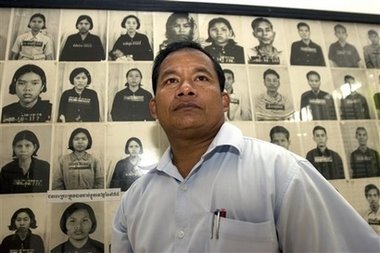30 years on
The Khmer Rouge cadre who photographed the prisoners of Tuol Sleng as they arrived at the former school-cum-interrogation center, will be the subject of a film by Academy Award-winning filmmaker Steven Okazaki (Days of Waiting,1990), who spent much of January in Cambodia, producing his latest documentary, The Conscience of Nhem En. The hour-long program, which will air on the United States' channel HBO in 2009, takes an intimate look at the country 30 years after the end of the Khmer Rouge’s reign of terror. In the film, three of the S-21 survivors will tell their stories, as does Nhem En, a 16-year-old at the time, who photographed thousands of prisoners before they were executed. His testimony lacks regret or sympathy. “The interesting thing for me was the photographer,” says Okazaki of Nhem En. “He was a Khmer Rouge soldier, who was trained in lighting and photography, but he is not a traditional sort of character to build a movie around. He was 16 years old and he is kind of a cold, cold person. It became sort of the challenge of this film: to build it around someone who actually is not admirable.” Okazaki traveled to Cambodia to conduct research for the film and was surprised to find so many of the interview subjects available. He decided to begin production immediately. Outfitted with just a single Sony HVR HDV camera, and assisted by an associate producer, he spent 17 days shooting interviews and capturing stills of the surviving prisoner photos. Many were intentionally destroyed by fire once the Khmer Rouge’s reign came to an end. “When the Vietnamese came in, I think they immediately realized the importance of them and preserved them, and decided that the prison would become a museum,” says Okazaki. “There is an exhibit there and they’ve mounted the photographs, sort of haphazardly. And sometimes you don’t know what it is that you are looking at. But for some strange reason, they used a large format camera and lighting, and did these quite beautiful portraits of the people before they were killed. Some of the people clearly know that they are about to die, but some people look strangely oblivious to what is going on.”
Note: Another documentary titled The Genocide Forgotten, by American professor Tim Sorel will also come out next year to mark the anniversary of the fall of the Khmer Rouge. He will focus on ongoing efforts to educate and inform Cambodians, especially young Cambodians, about what happened in the country in the 1970s, and how awareness of history can lead to a national healing. I helped out Tim with the shooting for his film in March this year. Expect a slew of documentaries and films early next year to acknowledge the anniversary of the end of the Khmer Rouge control of Cambodia.
Note: Another documentary titled The Genocide Forgotten, by American professor Tim Sorel will also come out next year to mark the anniversary of the fall of the Khmer Rouge. He will focus on ongoing efforts to educate and inform Cambodians, especially young Cambodians, about what happened in the country in the 1970s, and how awareness of history can lead to a national healing. I helped out Tim with the shooting for his film in March this year. Expect a slew of documentaries and films early next year to acknowledge the anniversary of the end of the Khmer Rouge control of Cambodia.



0 Comments:
Post a Comment
<< Home